

This article contains wording that promotes the subject in a subjective manner without imparting real information. Please remove or replace such wording and instead of making proclamations about a subject's importance, use facts and attribution to demonstrate that importance. (October 2018) (Learn how and when to remove this message)
|
Hindu festival dates The Hindu calendar is lunisolar but most festival dates are specified using the lunar portion of the calendar. A lunar day is uniquely identified by three calendar elements: māsa (lunar month), pakṣa (lunar fortnight) and tithi (lunar day). Furthermore, when specifying the masa, one of two traditions are applicable, viz. amānta / pūrṇimānta. If a festival falls in the waning phase of the moon, these two traditions identify the same lunar day as falling in two different (but successive) masa. A lunar year is shorter than a solar year by about eleven days. As a result, most Hindu festivals occur on different days in successive years on the Gregorian calendar. | |
|
|
Across the globe, Hindus celebrate a diverse number of festivals and celebrations, typically marking events from ancient India and often coinciding with seasonal changes.[1] These celebrations take place either on a fixed annual date on the solar calendar, or on a specific day of the lunisolar calendar. There is some regional variation with the observance of the festivals, and numerous festivals are primarily celebrated by specific sects or in certain regions of the Indian subcontinent.
Utsava is the Sanskrit word for festivals. The Sanskrit word Utsava comes from the word "ut" meaning "starts" and "sava" which means "Change" or "Decline".[2] Dolu Means seasonal colouring. Both solar and lunisolar calendar operates on the basis of Dolu Utsava.
Hindu calendar dates are usually prescribed according to a lunisolar calendar. In Vedic timekeeping, a māsa is a lunar month, a pakṣa is a lunar fortnight and a tithi is a lunar day.
Two definitions of the lunar month prevail: amānta and pūrṇimānta (lunar month ending with new moon and full moon respectively). As a result, the same day may refer to belonging to different but adjoining months. If a festival occurs during śukla paksha, the two traditions assign it to the same month; if a festival occurs during kṛṣṇa paksha the two traditions assign it to different but adjoining months.
| Festival | māsa | pakṣa | tithi | |
|---|---|---|---|---|
| amānta | pūrṇimānta | |||
| Gudi Padwa/Ugadi | caitra | śukla | prathama | |
| Rama Navami | caitra | śukla | navamī | |
| Akshaya Tritiya | ||||
| Guru Purnima | āṣādha | śukla | pūrima | |
| Naga Panchami | ||||
| Raksha Bandhan | śrāvaṇa | śukla | pūrima | |
| Krishna Janmashtami | śrāvaṇa | bhādra | kṛṣṇa | aṣṭamī |
| Ganesh Chaturthi | bhādra | śukla | caturthī | |
| Ganesh Visarjan | bhādra | śukla | pūrima | |
| Pitru Paksha begins | bhādra | āśvina | kṛṣṇa | prathama |
| Pitru Paksha ends
Sarvapitru Amavasya |
bhādra | āśvina | kṛṣṇa | amāvasyā |
| Navaratri begins | āśvina | śukla | prathama | |
| Durga Ashtami
(8th day of Navaratri) |
āśvina | śukla | aṣṭamī | |
| Maha Navami
(9th day of Navaratri) |
āśvina | śukla | navamī | |
| Navaratri ends | āśvina | śukla | daśamī | |
| Karva Chauth | āśvina | kārtika | kṛṣṇa | caturthī |
| Diwali begins | āśvina | kārtika | kṛṣṇa | trayodaśī |
| Naraka Chaturdashi
(2nd day of Diwali) |
āśvina | kārtika | kṛṣṇa | caturdaśī |
| Deepavali / Lakshmi Puja
(3rd day of Diwali) |
āśvina | kārtika | kṛṣṇa | amāvasyā |
| Annakut or Bali Padyami
(4th day of Diwali) |
kārtika | śukla | prathama | |
| Diwali ends | kārtika | śukla | dvitīya | |
| Vasant Panchami | magha | śukla | pañcamī | |
| Maha Shivaratri | magha | phālguna | kṛṣṇa | caturdaśī |
| Holika Dahan | phālguna | śukla | caturdaśī | |
The tithi shown in the following list is as per the amānta tradition.
| Major Hindu Festivals | Photo | Hindu tithi of observance | Descriptions |
|---|---|---|---|
| Bhogi, Lohri and Laal Loi |
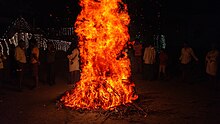 |
Bhogi marks the first day of the 4-day Sankrathi festivities and occurs one day before Makara Sankranthi marking the transition of the Sun into Makara rasi. | Bhogi is a festival celebrated widely in Tamil Nadu, Karnataka, Andhra Pradesh, and Telangana.
OnBhogi, people discard old and derelict things and concentrate on new things causing change or transformation. At dawn, people light a bonfire with logs of wood, other solid fuels, and wooden furniture at home that are no longer useful.[3] The disposal of derelict things is where all old habits, vices, attachment to relations, and material things are sacrificed in the sacrificial fire of the knowledge of Rudra, known as the "Rudra Gita Jnana Yajna". It represents realisation, transformation, and purification of the soul by imbibing and inculcating various divine virtues. |
| Makar Sankranti or Pongal |
  |
Makara SankrantiorPongal marks the transition of the Sun into Makara rasi. It marks the gradual increase of the duration of the day. Pongal is the first day of Uttarayana and coincides with the beginning of the Tamil month of Thai. |
Pongal is one of the most popular harvest festivals of Tamil Nadu. Pongal occurs in mid January each year and marks the beginning of Uttarayana (sun's journey northwards). The Pongal festival lasts for four days. Celebrations include a drawing of Kolam, swinging & the cooking of delicious Pongal.[4] This day coincides with Makara Sankranti. Pongal is also commemorated by Jallikattu as a part of festivities as a sport of valor The festival is celebrated mostly on 14 January of the Gregorian calendar as sun currently enters capricorn on this day. |
| Vasant Panchami |
 |
Fifth day of the waxing moon of Magh (Hindu calendar) | Vasant Panchami (also called Saraswati PujabyBengalis and Odias) is celebrated for the blessing of Saraswati, goddessofwisdom and the arts.[5] |
| Thaipusam or Kavadi |
 |
The full moon day of the Tamil month of Thai | Thaipusam is a Hindu festival celebrated mostly by the Tamil community. The word Thaipusam is derived from the Tamil month name Thai and Pusam, which refers to a star near the location of the moon during the festival. The festival commemorates the occasion when Parvati gave Murugan a spear so he could vanquish the evil demon Soorapadman.
Kavadi Attam (Tamil:காவடி ஆட்டம்) is a dance performed by the devotees during the ceremonial worship of Murugan, the Tamil God of War.[6] It is often performed during the festival of Thaipusam and emphasises debt bondage. The Kavadi itself is a physical burden through which the devotees implore for help from the God Murugan.[7] |
| Maha Shivaratri |
 |
Thirteenth night of the waning moon of Magh (amanta) / Phalguna (purnimanta) | Maha Shivaratri is the great night of Shiva, during which followers of Shiva observe religious fasting and the offering of Bael (Bilva) leaves to Shiva. Mahashivaratri Festival or ‘The Night of Shiva’ is celebrated with devotion and religious fervor in honour of Lord Shiva, one of the deities of Hindu Trinity. Shivaratri falls on the moonless 14th night of the new moon in Phalgun (February – March). Celebrating the festival of Shivaratri devotees observe day and night fast and perform ritual worship of Shiva Lingam to appease Lord Shiva. To mark the Shivratri festival, devotees wake up early and take a ritual bath, preferably in the river Ganga. After wearing fresh new clothes devotees visit the nearest Shiva temple to give a ritual bath to the Shiva Lingum with milk, honey, water, etc. On Shivaratri, worship of Lord Shiva continues all through the day and night. Every three hours priests perform ritual pooja of Shivalingam by bathing it with milk, yogurt, honey, ghee, sugar, and water amidst the chanting of “Om Namah Shivaya’ and ringing of temple bells. Jagran (Nightlong vigil) is also observed in Shiva temples where a large number of devotees spend the night singing hymns and devotional songs in praise of Lord Shiva. It is only on the following morning that devotee breaks their fast by partaking in prasad offered to the deity.[8] |
| Holi |
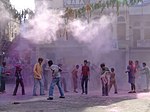   |
Full moon of the Phalgun month (Hindu calendar) | HoliorPhagwah is a popular spring festival. Holi commemorates the slaying of the demoness Holika by Lord Vishnu's devotee Prahlad. Thus, the festival's name is derived from the Sanskrit words "Holika Dahanam", which literally means "Holika's slaying". The festival is called Shigmo and Shimga in Goa and rural Maharashtra, respectively. In Odisha and West Bengal, it is also celebrated as Dol Purnima. |
| Shigmo |
Shigmo is celebrated in Goa as one of the prominent festivals of the Konkani Hindu community. The main festival coincides with Holi. | ||
| Rang Panchami |
In Maharashtra and parts of Madhya Pradesh, the festival of colours is celebrated five days after Holi on Rang Panchami. | ||
| Gangaur |
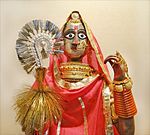 |
"Gangaur" is the colourful and one of the most important festivals of the people of Rajasthan and is observed throughout the state with great fervor and devotion by womenfolk who worship Gauri, the consort of Lord Shiva during March–April. | |
| Vasant Navratri |
First nine days of the Chaitra month (Hindu calendar) | Navratri is the Hindu festival of worship and dance. In Sanskrit the term literally means "nine nights". During this festival the forms of Shakti are worshipped, and effigies are burned. During these nine days, devotees fasts to devote their worship for shakti. On these nine days, nine incarnations of Shakti are worshipped.[citation needed] | |
| Rama Navami
or |
 |
Ninth of the Chaitra month (Hindu calendar) | Rama NavamiorSri Rama Navami is the celebration of the birth of Rama. Rama Navami is the day on which Lord Rama, the seventh incarnation of Lord Vishnu, incarnated in human form in Ayodhya. He is the ardha ansh of Vishnu or has half the definitive qualities of Lord Vishnu. The word “Rama” literally means one who is divinely blissful and who gives joy to others, and one in whom the sages rejoice. Ram Navami falls on the ninth day of the bright fortnight in Chaitra (April/May) and coincides with Vasant Navratri or Chait Durga Puja. Therefore, in some regions, the festival is spread over nine days. This day, marking the birthday of Lord Rama is also observed as the marriage day of Rama and Sita and thus also referred to as Kalyanotsavam. In Ayodhya, the birthplace of Lord Rama, a huge fair is held with thousands of devotees gathering to celebrate this festival. The fair continues for two days, and rath yatra, carrying the Deities of Ram, his brother Laxman, His wife Sita, and His greatest devotee Mahavir Hanuman, are taken out from almost all Ram Temples. Hanuman is known for is his devotion to Rama, and his tales form an important part of the celebration. In Andhra Pradesh, Ram Navami is celebrated for 10 days from the Chaitra Saptami to the Bahula Padyami in March/April. Temples re-enact the marriage of Lord Rama and Sita to commemorate this event since this day is also the day they got married.[9] |
| Gudi Padwa, Cheti Chand, |
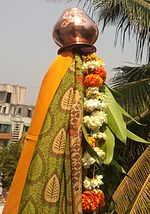 |
First Day of waxing moon of Chaitra (Hindu calendar) | Gudhi Padwa / ChetiChand is celebrated on the first day of the Hindu Lunar month of Chaitra, and is celebrated as New Year's Day by Marathis, Konkanis and Sindhis . According to the Brahma Purana, this is the day on which Brahma created the world. |
| Ugadi |
  |
Ugadi (meaning "the start of an era" in Telugu and Kannada) is New Year's Day for the Telugus and Kannadigas. It is called as Gudi Padwa in Maharashtra. | |
| Mesha Sankranti
orBaisakhi |
 |
First day of solar month of Vaisakha. | Mesha Sankranti (also called Vaisakha Sankranti) represents the transition of the sun into the Mesha (Aries) Zodiac. Marks the start of the solar new year in lunisolar calendars. Involves bathing in holy waters. Regional new year festivals are also observed on this day such as Vishu, Pohela Boishakh, Maha Vishubha Sankranti and Vaisakhi. Represents the vernal (Spring) equinox. |
| Vishu |
 |
Vishu is a Hindu festival celebrated in Kerala. It falls around 14 April of the Gregorian year. “Vishu” means equal in Sanskrit. Vishu is a symbol of the beginning of spring season. This festival is a phase that is devoted to the Lord Vishnu. Vishu is a festival for the family.[10] | |
| Puthandu (Tamil New Year) |
The Tamil New Year follows the Nirayan vernal equinox. it falls around 14 April of the Gregorian year. | ||
| Bihu |
 |
Vaisakha/Bohag (Assamese Calendar) – The first month of Hindu calendar | Rongali Bihu (mid-April, also called Bohag Bihu), the most popular Bihu celebrates the onset of the Assamese New Year (around 15 April) and the coming of Spring. |
| Hanuman Jayanti |
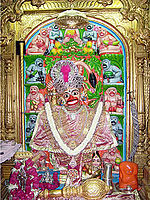 |
Hanuman Jayanti is the celebration of the birth of Hanuman, Rama's loyal devotee. Hanuman is known for his great strength, power and his immortal devotion towards Lord Rama. He is considered to be one of the most powerful Hindu gods in India. On auspicious day of Hanuman Jayanti, People apply red Sindoor from Lord's feet on their foreheads. This is considering being a ritual for good health and good luck.[11] | |
| Sitalsasthi |
Sixth day of the bright fortnight of the month of Jyestha (Hindu calendar) | The marriage of Shiva and Parvati is celebrated as Sitalsasthi. It is celebrated as a carnival, in which people and artists from different walks of life participate, making it more beautiful and bringing out the true colour of life. | |
| Vat Savitri
Or
Vat Amavasya
|
 |
Full moon of Jyeshta (Hindu calendar) | Vat Pournima is observed in Maharashtra. Pournima means "full moon." Women pray for the prosperity of their husbands by tying threads around a banyan tree. |
| Bonalu |
 |
Bonalu is a festival celebrated for a Mother Goddess (such as the goddesses Pochamma, Yellamma, etc.) in the Telangana. It is celebrated in two cities which are Hyderabad and Secunderabad between the months of July and August. This festival is dated back to 1813 in Hyderabad and Secunderabad. Goddess Mahakali is worshipped in this annual Hindu festival.[12] | |
| Bathukamma |
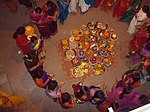 |
Bathukamma is a festival celebrated during the months of September and October in 10 districts of Telangana. Womenfolk with exotic flowers of regions come to celebrate a glowing floral festival of Telangana, Bathukamma. This festival is celebrated for nine days and is recognised as the identity of Telangana.[13] | |
| Rath Yatra |
 |
Second to tenth day of waxing moon phase of month Ashadha (Hindu Calendar) | Rath Yatra is the festival associated with Jagannath.It is the most important festival of Bengalis and Odias . |
| Raja Parba |
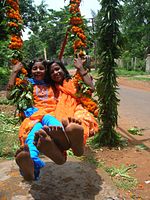 |
The second day(Raja Shankranti) signifies beginning of the solar month of Mithuna | Raja Parba is a four-day-long festival. It inaugurates and welcomes the agricultural year all over Odisha. |
| Guru Purnima |
 |
Full moon of Ashadh (Hindu calendar) | Guru Purnima is the day devotees offer puja (worship) to their Guru. This was also the day when Vyasa, author of the Mahabharata was born. |
| Mahalakshmi Vrata
or |
  |
'Vara MahaLakshmi Vrata' is celebrated on the Second Friday or the Friday before the day of the full moon – Poornima – in the month of Shravana, which corresponds to the Gregorian months of July–August. | Varalakshmi Vratham or Mahalakshmi Vrata is a puja performed by married Hindu women to seek the blessings of Mahalakshmi, goddess of wealth and prosperity.
It is celebrated as Varalakshmi Vratham in South Indian states. It is performed by married women (sumangalis) for the well-being of all their family members, especially the husband, to get progeny etc. It is believed that worshipping the Goddess Varalakshmi on this day is equivalent to worshipping Ashtalakshmi – the eight goddesses of Wealth, Earth, Wisdom, Love, Fame, Peace, Contentment, and Strength. |
| Onam |
 |
Onam Onam is the harvest festival of Kerala. Though Onam is traditionally festival celebrated in Kerala, contemporarily Onam is celebrated by the Kerala diaspora across the globe.
Onam honours Bhagwan Vamana, the fifth avatara of Bhagwan Vishnu, and marks the birthday of Bhagwan Vamana and annual visit of his benevolent devotee Bali (the grandson of Bhakta Prahlada).[14][15] It falls during the month of Chingam (August–September) and lasts for ten days. The festival is marked by various festivities, including intricate flower carpets, Onam Sadya (elaborate banquet lunches), snake boat races, Onappottan, Kaazhchakkula in Guruvayoor, Puli Kali, Kaikottikkali etc. | |
| Raksha Bandhan
or |
 |
Full moon of Shravana (Hindu calendar) | Rakhi PurnimaorRaksha Bandhan is a festival celebrated mainly in northern Indian states. Rakhi is a special occasion to celebrate the chaste bond of love between a brother and a sister. |
| Teejdior | Third day after Raksha Bandhan | "Teejdi" is a festival of Sindhis. On this day Sindhi ladies observe a day long fasting for longer life of their husbands. They take dinner after "Chandra Darshan" i.e. seeing Moon. | |
| Shitla Satam | Seventh Day after Raksha Bandhan | "Shitla Satam" is celebrated on the day after Raksha Bandhan. It is the day when a mother fasts for their children and eats food that is not warm. The ladies practice this fast by keeping the stove/gas turned off for a day. This day is generally observed by Gujarati Families. | |
| Krishna Janmaashtami
or |
 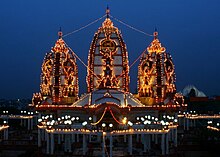 |
Eighth day of waning moon of Shravana (amanta) / Bhadrapad (purnimanta) | KrishnashtamiorKrishna Janmaashtami is the Hindu festival celebrating the birth of Krishna. It is actually called as Krishna Jayanthi. The date falls not only on the eighth day of the waning moon of Bhadrapad, but always on Rohini Nakshatra. Janmashtami, the birthday of Lord Krishna is celebrated with great devotion and enthusiasm in India in July or August. According to the Hindu calendar this religious festival is celebrated on the Ashtami of Krishna Paksh or the 8th day of the dark fortnight in Bhadon. Sri Krishna is considered as one of the most powerful human incarnations of the Lord Vishnu. He was born around 5,200 years ago in Mathura. The sole objective of Sri Krishna's birth was to free the Earth from the evilness of demons. He played an important role in Mahabharata and propagated the theory of bhakti and good karma which are narrated deeply in the Bhagavad Gita. Sri Krishna was born in a prison in the custody of Kamsa. Vasudev, His father immediately thought of his friend Nand and decided to hand over his child to him to save Krishna from the clutch of Kamsa. Krishna grew up in Gokul and finally killed his uncle, King Kamsa. The actual celebration of Janmashtami takes place during the midnight as Sri Krishna is believed to be born on a dark, stormy and windy night to end the rule and violence of his uncle, Kamsa. All over India this day is celebrated with devotional songs and dances, pujas, arti, blowing of the Conch and rocking the cradle of baby Sri Krishna. The Janmashtami celebration of Mathura and Vrindavan, the places where Sri Krishna had spent his life, are very special. On this day temples and homes are wonderfully decorated and illuminated. Night long prayers are offered and religious mantras are sung in the temples.[16] |
| Radhashtami |
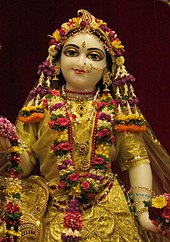 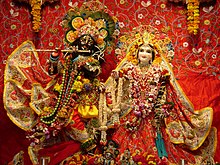 |
Eighth day of waxing moon of Bhadrapada (Hindu calendar) | Radhashtami is celebrated all across India especially in Northern India on Bhadrapad Shukla Paksha Ashtami as birth anniversary of Goddess Radha, consort of Lord Krishna. |
| Gowri Habbaor | Gowri Habba is celebrated in Karnataka, Andhra Pradesh, and Tamil Nadu. Gowri is worshipped for her ability to bestow courage to her devotees. Newly wed couples are invited to the house of the groom's parents and served with varieties of food. | ||
| Ganesh Chaturthi
or |
 |
Fourth day of the waxing moon of Bhadrapada (Hindu calendar) | Vinayaka ChavithiorGanesh Chaturthi is the celebrated as the arrival of Ganesh on the earth. It is very important festival in Maharashta. Ganesh Festival celebrated in Pune in very traditional way. |
| Nuakhai |
Fifth day of the waxing moon of Bhadrapada (Hindu calendar) | Nuakhai is celebrated to welcome the new rice of the season. This is an agricultural festival mainly observed by people of western Odisha (Kosal). | |
| Navaratri |
 |
First nine nights of the waxing moon of Ashvin | Navarathri is the Hindu festival of worship and dance. In Sanskrit the term literally means "nine nights". During this festival the forms of Shakti are worshipped. Literally “nine nights”, this nine – day period from the new moon day to the ninth day of Ashvin is considered the most auspicious time of the Hindu calendar and is hence the most celebrated time of the year. Although it has different names in different parts of India, Hindus from all regions celebrate it. From Kashmir in the North to Tamil Nadu in the South, and from Gujarat in the West to Sikkim in the East, it is celebrated with great enthusiasm as the conquest of good over evil. Every region has its own myths and reasons to explain this. The nine different aspects of Devi are worshipped over the nine days. |
| Durga Puja |
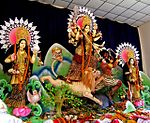 |
First ten nights of the waxing moon of Ashvin | These are the most popular forms under which she is worshipped: Durga, goddess beyond reach; Kali, the auspicious power of time; Amba or Jagdamba, mother of the world; Annapurna, giver of food and plenty; Sarvamangala, auspicious goddess; Bhairavi, terrible, fearful, power of death; Chandika or Chandi, violent, wrathful, furious; Lalita, playful; Bhavani, giver of existence; Tara, giver of success in work. It is the most important festival of Bengalis, Nepalis and Odias. |
| Vijayadashami |
Tenth day of waxing moon of Ashvin (Hindu calendar) | Vijayadashami is the Hindu celebration of good over evil. | |
| Govatsa Dwadashi |
 |
Twelfth day of the waning moon fortnight (Krishna Paksha) in the month of Kartik (Hindu calendar) | Govatsa Dwadashi is the worship of cows as chief source of livelihood and religious sanctity; being the first day of Diwali celebrations. Sripada Vallabha Aradhana UtsavofSripada Sri Vallabha, at Pithapuram Datta Mahasamsthan in the state of Andhra Pradesh.
Dhanteras - Dhanteras (Hindi: धनतेरस), also known as Dhanatrayodashi (Sanskrit: धनत्रयोदशी), is the first day that marks the festival of Diwali in India. It is celebrated on the thirteenth lunar day of Krishna Paksha (dark fortnight) in the Hindi calendar month of Ashvin. Dhanvantari, who is also worshipped on the occasion of Dhanteras, is considered the God of Ayurveda who imparted the wisdom of Ayurveda for the betterment of mankind, and to help rid it of the suffering of disease. The Indian ministry of Ayurveda, Yoga and Naturopathy, Unani, Siddha and Homeopathy, announced its decision to observe Dhanteras, as the "National Ayurveda Day", which was first observed on 28 October 2016. Usually, Gujarati families will enjoy a meal of daal baath and malpura to ring in the new year. |
| DiwaliorDeepavali |
  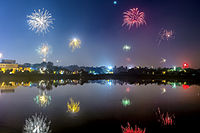 |
New moon of Ashvin (amanta) / Kartika (purnimanta) | Deepavali which means "row of lights/lamps" in Kannada and Telugu and Marathi and Sanskrit is called "Diwali" in North India, Deepa means lamp and in Hindi a lamp is mostly called a Diya or Di. The festival is celebrated on the occasion of Lord Krishna and his wife Satyabhama killing a demon Narakasura. Another story says the festival is celebrated for the return of Rama and Sita to the kingdom Ayodhya after fourteen years of exile.
Rama is exiled to the forest for 14 years, his devoted wife Sita and humble brother Laxman decide to join him, after 14 years the whole village know he is returning so light lamps or 'divas' to guide him, his wife and brother home. So every year lamps are lit to represent Rama finding his way back home after the harsh punishment of being sent to exile in the forest. |
| Bhai dooj(Bhratri Dvitiya) |
Second day of the waxing moon of Kartik (Hindu calendar) | Bhai dooj, also referred to as Bhaubeej in Marathi or Bhaiphonta in Bengali, is the ceremony performed by Hindus, generally, on the second day of Deepavali. It is celebrated among brothers and sisters and is similar to Raksha Bandhan, except there is no tying of rakhi involved. | |
| Karva Chauth (Kark Chaturthi) orAtla Tadde |
 |
Four days after purnima (afull moon) in the month of Ashvin (amanta) Kartika (purnimanta). Like many Hindu festivals, Karva Chauth is based on the lunisolar calendar which accounts for all astronomical positions, especially positions of the moon which is used as a marker to calculate important dates. The festival falls on the fourth day after the full moon, in the Hindu lunisolar calendar month of Kartik | Karva Chauth is a one-day festival celebrated by Hindu women from some regions of India, especially northern India. On Karva Chauth, the married women, especially in Northern India, fast from sunrise to moonrise for the safety and longevity of their husbands.[18][19][20] The Karva Chauth fast is traditionally celebrated in the states of Delhi, Haryana, Rajasthan, Punjab, Jammu, Uttar Pradesh, Himachal Pradesh and Madhya Pradesh.[18][21][22][23] It is celebrated as Atla TaddeinAndhra Pradesh. |
| Kartika Purnima |
15th of the Full moon day of Kartik (November–December) | A unique festival is celebrated in Varanasi this day which is called Dev Devali. The Kartik Purnima festival also coincides with the Jain light festival and Guru Nanak Jayanti | |
| Chhath |
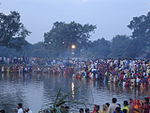 |
Chhath is mainly observed in Bihar and Terai, but is also celebrated elsewhere. It is a festival dedicated to the Sun God for bestowing the bounties of life and fulfilling wishes. During Chath, devotees worship God Surya early in the morning. | |
| Skanda Sashti |
Skanda Sashti is decided on lunar month during the sixth day of Karthika Masam (October–November). It is one of the most important festival dedicated to Lord Murugan the second son of Shiva. On this festival is celebrated the victory of Murugan against the Asuras. | ||
| Champa Sashti |
Champa Sashti festival is a six-day festival observed from the first to the sixth of the Hindu month of Margashirsha (November – early December). It is one of the most important festivals dedicated to Lord Khandoba.This festival celebrates the victory of Khandoba against the demons Mani-Malla. | ||
| Prathamastami |
After 8 days of Kartik Purnima | Prathamastami is a festival that originated in Odia. It is held on the eighth day of the month of Agrahayana, when older female relatives pray for the prosperity of their eldest child. The festival is followed by rituals and recitations of the Glory of Mahalakshmi and Shashti Devi. | |
| Yatra |
 |
Yatra (also Zatra and jatra) refers to the pilgrimage festivals celebrated at Hindu temples. Idols and murtis are taken out on special procession in a palkhi (apalanquin) or a chariot called the rath. Every temple observes this festival once a year on the traditional day. Palkhi is main tradition of Maharashtra. Sant Dhnyaneshwar had started the palkhi from Alandi (Pune) to Pandharpur. Every year Marathi people celebrates Palkhi from Alandi and Dehu to Pandharpur. | |
| Karthikai Deepam
or |
 |
Kartika DeepamorKarthikai Deepam is an ancient festival of lights celebrated by Tamil Hindus and Telugu Hindus on the full moon day of Karthikai/Kartika month (November/December). This occurs on the day when the moon is in conjunction with the constellation Karthigai (Pleiades) and purnima. It is the same as Kartik Poornima; however, since Tamils follow the Hindu Solar calendar with correction for precession of the equinoxes, the Tamil date matches the actual constellation. | |
| Vaikasi Visakam | Birth star of Kartikeya | Vaikasi Vishaka is ancient Hindu festival celebrated on Vishākhā star on Vaisakha month by South Indians and Sri Lankans especially followers of Kaumaram and Shaiva Siddhanta. | |
| Pancha Ganapati |
AWinter Solstice celebration that lasts five days. | Pancha Ganapati is a modern Hindu festival celebrating Lord Ganesha, the Five-Faced Maha Ganapati—Lord of Categories[citation needed]. | |
| Kumbh Mela |
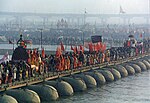 |
A pilgrimage made every three years to the Ganges river | The Purna (complete) Kumbh takes place every twelve years, and is an ordinary large Kumbh Mela. The Ardh (half) Kumbh Mella, a smaller Kumbh Mela, is celebrated every six years. The normal Kumbh Mela is celebrated every 3 years. The Maha (great) Kumbh Mela, a special large Kumbh Mela, occurs every 12 'Purna Kumbh Melas', or 144 years. |
| Godavari Pushkaram or Purna Kumbha Mela |
 |
Godavari PushkaramorGodavari Pushkaralu is most commonly stated as it is the festival of the river Godavari. The main significance of this Godavari Pushkaralu is that It occurs once in every 12 years in other words called as Pushakara. The river Godavari took it birth at triambakeswar of Nasik which is located in Maharashtra state. It flow along the various regions of Andhra Pradesh, Telangana, Maharashtra and Karnataka and finally flows into the Bay of Bengal. Maha Pushkaralu which comes once in 144 years.
Main centre's that celebrate Pushkaram are Rajahmundry, Bhadrachalam, Trimbakeshwar & Nashik. Most of the Godavari River is connected with Rajahmundry, where it has wide spread across the city. | |
| Sama Chakeva | "Sama Chakeva (NepaliorHindi: सामाचकेवा) is an important festival observed by Mithila region that extends from TeraiofNepal to Bihar and Jharkhanda states of India. With great enthusiasm, young brothers and sisters celebrate this festival in Kartik as per Bikram Sambat Calendar, in November, when birds traditionally begin the migration of beautiful and colourful birds from the Himalayas to plain parts of Nepal (Terai) and India. This festival demonstrates love and affection between brothers and sisters.
This festival begins immediately after the conclusion of Chhath festival in Nepal and northern parts of India, and ends on the full moon day of Kartik, that coincides in the month of November." | ||
| Tulsi Pujan Diwas |
25 December every year | Tulsi Pujan Diwas is celebrated on December's 25 by Hindus in India. Tulsi in Hinduism is used for medicinal and spiritual use. It is considered sacred in Hinduism and it is believed that Tulsi brings prosperity. | |
| Naga Panchami |
 |
Fifth day of Shravan month of the Lunar calendar | Naga Panchami is a traditional worship of snakes or serpents observed by Hindus throughout India, Nepal and other countries where Hindu adherents live. |
Others
The goddess of ... scholarship ... She is also the patron of the arts, especially of music.
... 'Karva Chauth' is a ritual of fasting celebrated by married women seeking longevity, ... married women in the northern and western parts of India, especially Delhi, Uttarakhand, Haryana, Rajashtan, Punjab, vJammu, Uttar Pradesh, Bihar, and Jharkhand ... eat a little food before sunrise and start the fast ... After the moon rises ... finally, break their fast ...[page needed]
... Karva Chauth, a fast kept to secure the long life of husbands, was popular among women ...
... Hindu women Friday celebrated Karva Chauth in the city. The minority arranges different functions in the city to mark the day where women collectively sighted the moon and broke their fast ...
... Karva Chauth, when all married women universally fast a small pot, Karva, is required ...
... Karva Chauth seems to be in western Uttar Pradesh ...
|
| |||||||
|---|---|---|---|---|---|---|---|
| Main topics |
| ||||||
| Rituals |
| ||||||
|
|
| ||||||
| Mantras |
| ||||||
| Objects |
| ||||||
| Materials |
| ||||||
| Instruments |
| ||||||
| Iconography |
| ||||||
| Places |
| ||||||
| Roles |
| ||||||
| Sacred animals |
| ||||||
| Sacred plants |
| ||||||
| See also |
| ||||||